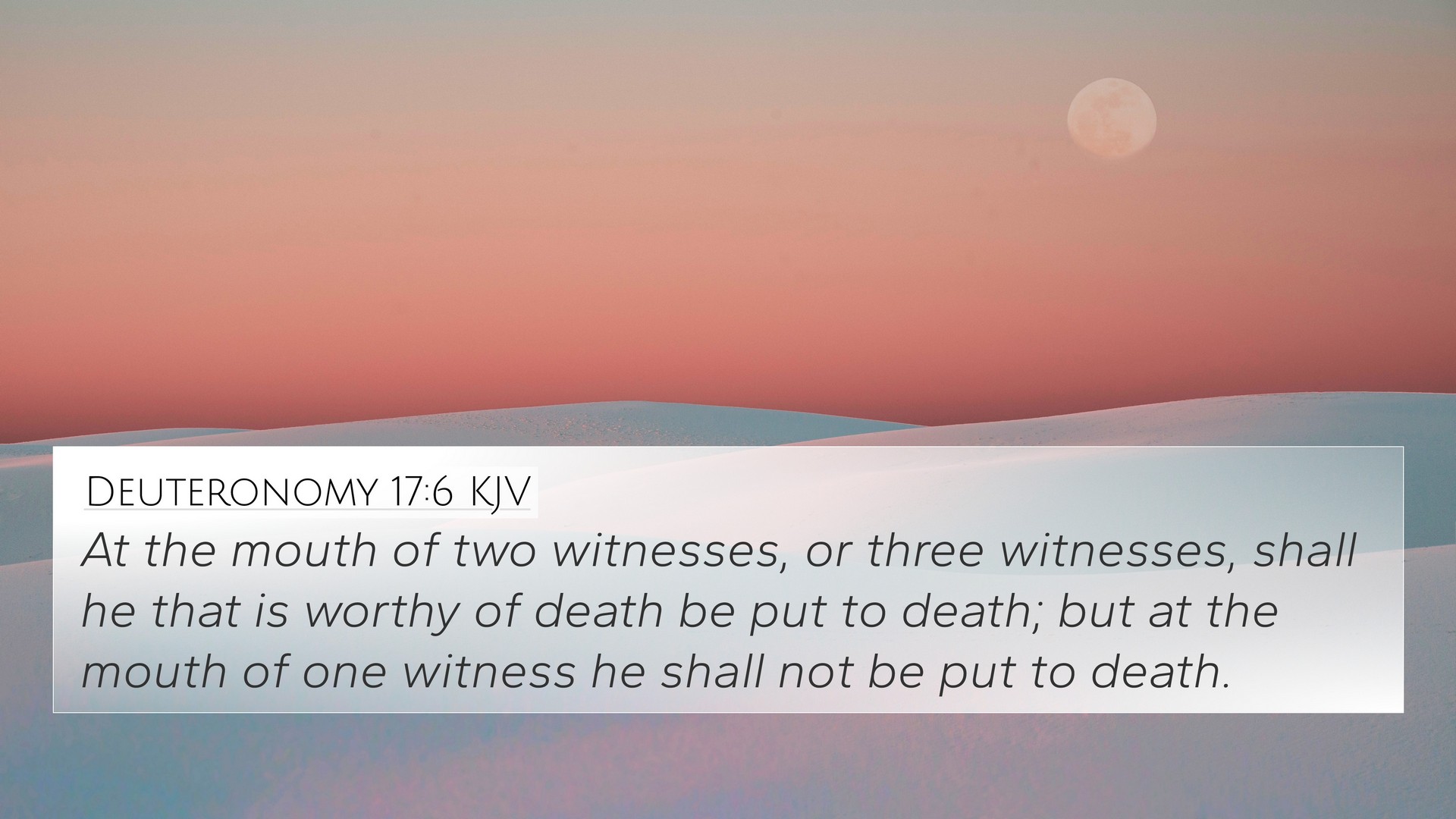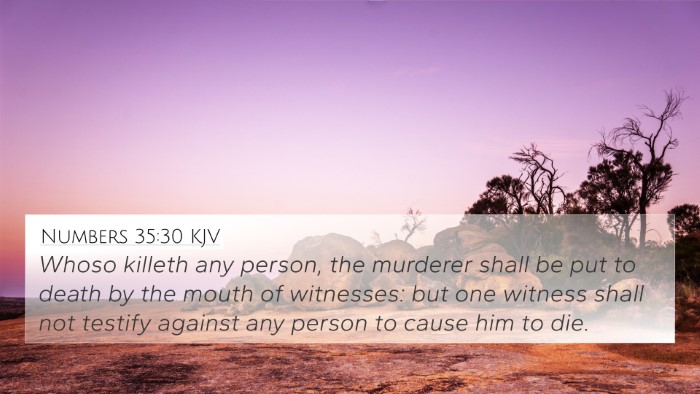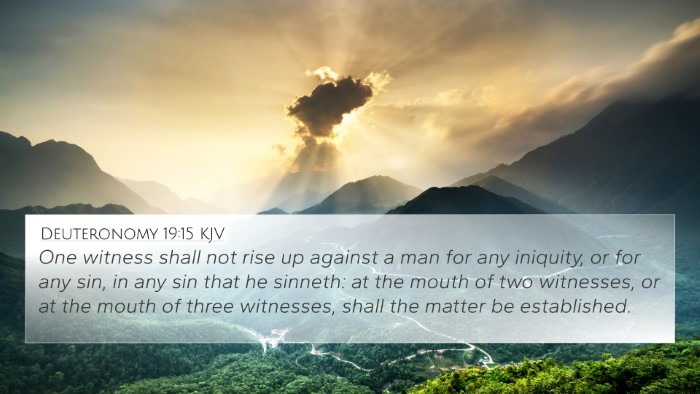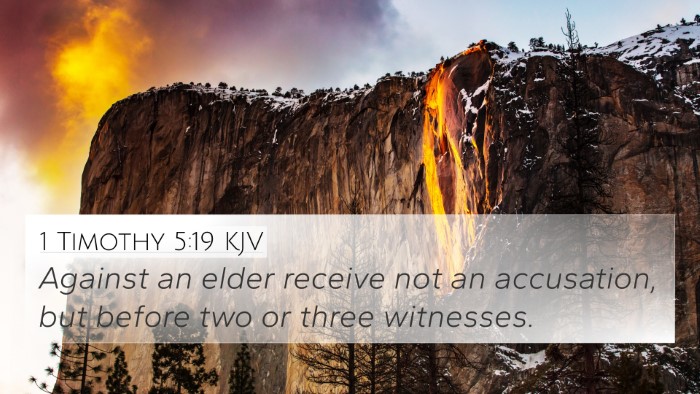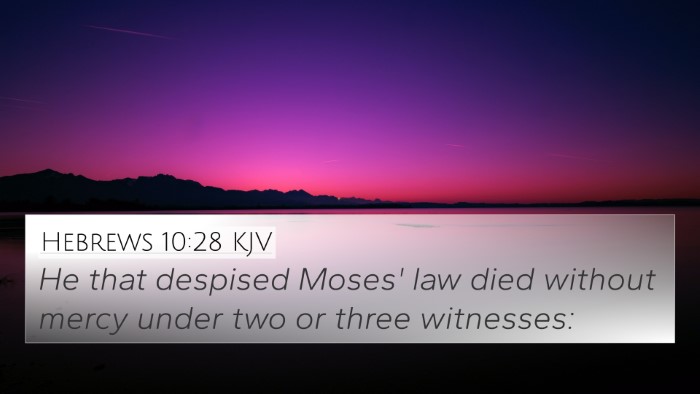Understanding Deuteronomy 17:6
Verse: "At the mouth of two witnesses, or three witnesses, shall he that is worthy of death be put to death; but at the mouth of one witness he shall not be put to death." - Deuteronomy 17:6
Meaning and Insights
Deuteronomy 17:6 presents a legislation involving the principles of justice and fairness in the context of capital punishment. The requirement of multiple witnesses serves as a safeguard against wrongful conviction, emphasizing the necessity of corroborative testimony.
Key Themes and Interpretations
- Principle of Witnesses: The mention of “two or three witnesses” signifies the importance of having more than one testimony to establish the truth of an accusation, illustrating a foundational principle of justice in both Old and New Testament teachings.
- Divine Justice: This verse reflects God’s concern for justice and order, as it prevents hasty judgments based on the testimony of a single person. It encourages careful examination of evidence before punishment is administered.
- Protection Against False Accusation: The requirement for multiple witnesses acts as a protective measure against the potential abuse of judicial authority, which ensures that individuals are not wrongfully condemned based on insufficient evidence.
- Legal Framework for Society: The direction to anchor legal decisions in the testimony of witnesses indicates God’s design for a fair judicial process, underscoring His desire for righteousness in community interactions.
Related Cross-References
This verse connects with several other scriptural passages, highlighting thematic relationships within the Bible:
- Matthew 18:16 - “But if he will not hear thee, then take with thee one or two more, that in the mouth of two or three witnesses every word may be established.”
- John 8:17 - “It is also written in your law that the testimony of two men is true.”
- 2 Corinthians 13:1 - “In the mouth of two or three witnesses shall every word be established.”
- 1 Timothy 5:19 - “Against an elder receive not an accusation, but before two or three witnesses.”
- Hebrews 10:28 - “He that despised Moses' law died without mercy under two or three witnesses.”
- Numbers 35:30 - “Whoso killeth any person, the murderer shall be put to death by the mouth of witnesses.”
- Proverbs 18:17 - “The first one to plead his cause seems right, until his neighbor comes and examines him.”
- Exodus 20:16 - “Thou shalt not bear false witness against thy neighbor.”
- Acts 1:15-26 - Reveals the process used to select Matthias as an apostle, emphasizing the need for multiple witnesses to the apostles' resurrection experiences.
- Romans 2:6 - “Who will render to every man according to his deeds.”
Commentary Insights
Insights from various public domain commentaries provide a richer understanding of this verse:
Matthew Henry’s Commentary
Henry emphasizes that the law serves both as a moral guide and a judicial standard, focusing on the necessity of corroborated testimony to avoid false accusations and ensure just sentencing.
Adam Clarke’s Commentary
Clarke elaborates on the practical aspects of this law, introducing historical context about its application in ancient Israelite society and underlining its relevance in modern judicial practices regarding capital offenses.
Albert Barnes’ Notes
Barnes highlights the theological implications of the need for multiple witnesses, suggesting that it serves as a reflection of God’s character, who desires truth and integrity within human interactions.
Conclusion
In summary, Deuteronomy 17:6 provides a crucial framework for understanding justice and the importance of truthful testimony in establishing legal and moral standards. This verse allows for a comparative Bible verse analysis, as it links with other scriptures that discuss the efficacy and necessity of witness accounts in legal situations.
Exploring Further Connections
For those interested in broader implications and connections between Bible verses, this teaching reflects a fundamental biblical principle that calls for fairness and integrity across various situations.
Using Cross-Reference Tools
The study of cross-referencing biblical texts, utilizing tools such as a bible concordance or a bible cross-reference guide, can enhance the understanding of interconnected themes and verses. This allows for greater insight into how individual verses relate to God's overarching narrative.
Practical Application
To implement the lessons learned from Deuteronomy 17:6, readers can apply its teachings in personal and communal contexts. Recognizing the weight of words and the significance of testimony highlights the moral responsibility to uphold truth and justice in all interactions.
